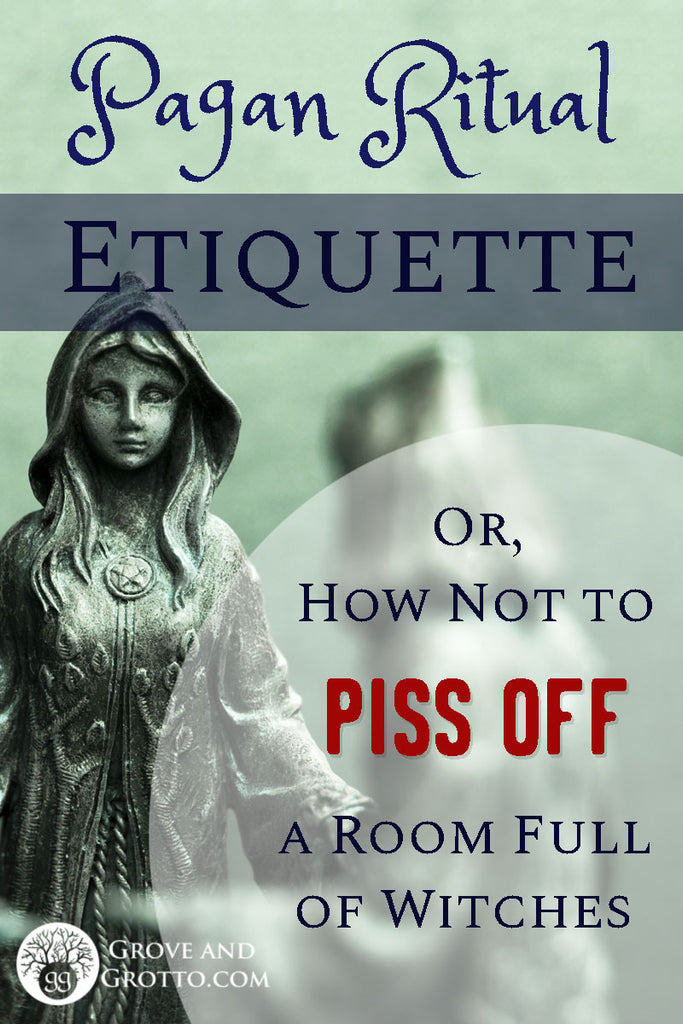
Emily Post never wrote about proper behavior at Pagan rituals. Fortunately, there's always been common sense (and the Golden Rule) to guide us.
Even so, a lot of people get nervous about attending Pagan rituals. Especially if they're not Pagan or have never been to one before.) What am I supposed to do, or not do? Are there any special rules that apply only to Pagans? Mostly, you'll find that being polite at a Pagan gathering is the same as being polite at any other public occasion.
The following eight etiquette tips aren’t rules. Pagans hate rules. Instead they are general suggestions for not making an ass of yourself at your next (or first) Pagan ritual:
1. Be on time.

It’s true what you’ve heard. Pagans, as a group, are very, very bad at starting anything on time. Pagans have coined the term “PST” (Pagan Standard Time), an imaginary time zone that all Pagans live in.
Joking aside, being late is rude. Full stop. So arrive at least a few minutes before the scheduled start time. True, you will probably end up waiting on other attendees (and maybe on the ritual’s hosts). Pagan lateness is no myth, and it has the unfortunate effect of making people show up later and later the more it’s expected. Still, that’s not a good reason to become a part of the problem.
2. Be discreet.

For many people—especially Millennials—being openly Pagan is no big deal. But some people can face serious consequences if word gets out. Pagans have lost their jobs, homes, and custody of their children. In a world without sure protection for religious minorities, it should be up to each person how and when they want to come out of the broom closet.
Attending a public ritual can be a big risk for someone who’s trying to keep their Pagan religion a secret. Be understanding if people don’t want to answer questions or give out their real names. Journalists need to identify themselves before taking photos or interviewing people.
As a guest, you should take photos only with explicit permission. Don’t tag people on social media, unless asked. Before publishing any photos, be sure there isn’t anything potentially identifying (like unique clothing or license plates) hiding in the corners. After the ritual, be careful not to say things that might “out” other attendees to the general public.
3. Minimize distractions.

The etiquette here is the same as it would be for any public performance or gathering. Be attentive, silence your phone, don’t bring pets or small children unless you’re confident they won’t cause a disruption. (I won’t waste space talking about the importance of good hygiene and basic manners.)
4. Hands off the ritual tools.
Pagans tend to use a lot of stuff: Awesome-looking blades, cauldrons, statues of gods and goddesses, ceremonial robes, fruits and flowers. It’s enough to cause a sensory overload! Tactile folks may be tempted to fondle everything on the altar. (Oooh, shiny knife!)
But wait! Many Pagan tools are ritually consecrated and energetically keyed to their owners. It is a breach of etiquette to touch someone else’s tools without permission.
If you ask, some Pagans will be happy to let you handle their treasures. (After ritual is usually a better time than just before, when the tools are likely to be charged and primed to do their jobs.) Some won’t. Be ready to gracefully accept a "no," and don’t push it if the owner hesitates.
5. Respect sacred space.

Pagans don’t have fixed places of worship like a church or synagogue. Like a turtle with its shell, we carry our spiritual home with us everywhere we go. Pagans transform everyday places—like picnic tables and living rooms—into temples for the duration of a ritual.
Just because it looks like ordinary space, doesn’t mean it’s not also sacred. Once the space is set, respect it as you would any other house of worship. That will mean different things depending on the tradition. It always means refraining from littering, arguing, or harming people. It may also mean removing your shoes, keeping silence, or leaving food and drinks at the door. If you’re not sure what’s expected in the sacred space, check with someone who looks like they know what they’re doing.
In some Pagan rituals, respecting the sacred space means committing to the ritual for the duration. Leaving early—even if you decide the ritual’s not for you—can create a physical and energetic disruption that affects everybody there. If you think you may need to bail, talk to the organizer beforehand to make an exit plan.
The Wiccan term “casting the circle” refers to the practice of creating a boundary between the magickal and mundane worlds. The circle is a kind of container for the energy created or invoked during the ritual. (Non-Wiccans also use psychic boundaries and containers in the creation of sacred space.) A common ritual practice is "cutting a door" in the circle to allow participants to leave, while leaving the structure of the circle intact.
Breaking the circle is a no-no in solemn or energy-intense rituals. (It’s less of an issue at large or informal public rites.) If you must leave early, try to do so with minimal impact on the ritual’s flow.
6. Participate!

Pagan ritual is not a spectator sport. If you’re attending a ritual, it’s usually expected that you will participate. That may mean many different things: Singing, chanting, interacting with other people, or just sitting quietly during a meditation or blessing.
Don’t worry if you don’t know exactly what to do. Most Pagans are very welcoming toward curious observers, as long as you’re outwardly respectful and make even a small effort to join in.
Being a willing participant means being in harmony with the purpose of the ritual. It doesn’t mean that you need to do something that goes against your will. You should never feel required to touch another person, eat or drink something, speak publicly, or do anything else that makes you uncomfortable. It is unethical for a ritualist to try and pressure you into doing something after you’ve expressly declined.
Experienced ritualists will often let you know in advance what the ritual is all about. That way, you can make an informed decision to be in or out of the circle before the circle is cast. If you have physical limitations, allergies, or other concerns, this is the time to seek accommodation. The ritualist may not be able to work with every type of special need, but you can always ask. In most cases, the presenter will want to make the ritual enjoyable for as many participants as possible.
7. Don’t rewrite the ritual.

“That’s not how we do it in Amtrad.”
“I object to the gender-binary construction of the Great Rite.”
“Do you have gluten-free cakes and ale? Also, I’m allergic to incense. Also, wasn’t this thing supposed to be over ten minutes ago?”
Attending a Pagan ritual means agreeing to defer to the Priest or Priestess in charge for five minutes to an hour. Doesn’t mean you have to agree with them. Doesn’t even mean you have to respect them. But unless you’re witnessing something very dangerous or illegal, keep your critiques and corrections to yourself.
The person performing the ritual is probably not there to recruit followers or impress people. He or she is almost certainly not being paid. The Pagan ritualist is probably performing the ritual out of love, to give a gift to the best of their ability.
With these things in mind, I recommend approaching a Pagan ritual with an attitude somewhere between the ones you’d bring to a college professor’s lecture and a kid’s dance recital: Be respectful, because a lifetime’s collection of knowledge is on display. (Yes, along with a lifetime’s collection of opinions, biases, and foibles.) Be generous and prepared to applaud for even a mediocre performance.
Paganism has a permissive, inclusive culture that values individualism and dissent. The result is that there is a know-it-all, backseat-driving heckler at every other public ritual. Don’t be that guy (or gal). Offer those “helpful” suggestions afterward, and only if you feel they’d truly be welcomed.
8. Watch your energy.

When I first started bringing my non-Pagan wife, Sarah, to Pagan rituals, she was worried. She thought that everyone could read her mind. She was very careful not to think skeptical thoughts (or anything that could be offensive) around our Pagan friends. She would enter the ritual circle broadcasting mental apologies to anyone who might happen to overhear her thoughts.
Obviously, this is ritual courtesy taken to an extreme degree. Sarah was overestimating the degree of psychic sensitivity within the Pagan community. I don’t doubt that high-level telepaths walk among us—but they must have very thick skins by now.
No, the real concern is that bad vibes are contagious to everyone, not just to super-psychics. If you walk into a ritual feeling angry, anxious, hostile, or ill, it’s bound to have a negative effect on the total atmosphere within the circle. People come to ritual for a chance to let their shields down and soak up energy within a sacred space. It’s just not fair to walk in there and wallop them with your crap.
Many Pagan rituals begin with grounding and cleansing activities: Smudging or anointing participants, a few deep breaths, a centering meditation. Wiccans may enter the circle stating that they come “in perfect love and perfect trust.” All are ways of reminding the attendees to check their energy before entering ritual space.
Everybody feels bad sometimes, and that doesn’t mean you have to quarantine yourself. One of the purposes of spirituality is to comfort the sad and heal the wounded. You don’t need to be a person who walks around spreading flowers and rainbows everywhere. It’s more about being a conscious custodian of your energy when you know you’ll be sharing it with others.
Enjoy this article? Read more in the archive!

